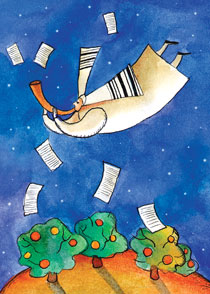Issue Archive
Commentary: It Comes Down to a Story

That a future generation might know—children yet to be born—and in turn tell their children. —Psalms 78:6
Every holiday functions in part as a telling, as a story. It is not enough for any religion, culture or civilization to merely have laws, rules and celebrations, there must be a narrative and somewhere a cast of characters. This is the case for the High Holidays now upon us, which at a first glance might seem thin on plot as compared to Passover, Hanukka or Purim. Yet Rosh Hashana reminds us of the greatest story, the Creation of the World, which is an ongoing and continual process. Yom Kippur tells us of God’s complete involvement with His world, His attention to all our personal details, our inevitable failings. On the afternoon of this holy day we read the Book of Jonah, about a man who shirks his responsibilities, boards a ship and is swallowed by a fish. Sukkot reveals a whole people traveling with wondrous clouds protecting them all about—at their sides, above them, even at their feet. And a pillar of fire, itself almost a personality, leading them through their nights.
It seems a mystery why we humans need to have and to tell these stories. Why must we put everything into such a framework? Why must we transform our experience of time on Earth by making narratives of our lives, whether these are simple anecdotes we tell ourselves or what, in grander groupings and configurations—families, peoples and nations—we tell each other and those around us. It seems to me, both as a novelist and physician, that there is a neurological imperative to this phenomenon of moving through time, gathering experience and then distilling and assembling a tale that can be passed on. We cannot get from minute to minute, let alone millennium to millennium, without a narrative, without a basic plot. Perhaps this is the only way to deal with two conflicting aspects of existence that are completely contrary.
It is hard to avoid the fact that we live in a magnificent, infinitely elaborate world, that each one of us is indeed a brilliantly conceived universe. After 20 years as a neuroradiologist, I am still awestruck by the complexity of the human body, by its endless array of components and chemical reactions, its grand macroscopic and microscopic infinitude. One could easily spend one’s whole career studying one specific kind of cell or even one communication pathway, where one cell speaks to another. What we see all around us implies an engaged intelligence continually forming and sustaining us.
At the same time, we constantly encounter the shock of history, both personal and collective, where terrible things happen, where unimaginable suffering is possible, where we are alone, adrift and disoriented—where we are essentially plot-less.
The telling of the holidays has its own imperative for us as individuals and as a people. Although these days come at appointed seasons of the year, they are suspended above time like all stories and help us make sense of things that can never truly be reconciled or understood with logic alone.
Tellings and stories do not always fully explain their subjects or themselves, their endings may yet be in the future, but we cannot exist without them. We preserve them and they preserve us, through distance and time. They make everything bearable and everything possible. They can even bring us joy.
Aryeh Lev Stollman is the author of two novels, The Far Euphrates and The Illuminated Soul, and a story collection, The Dialogues of Time and Entropy (all from Riverhead Books).










 Facebook
Facebook Instagram
Instagram Twitter
Twitter
Leave a Reply